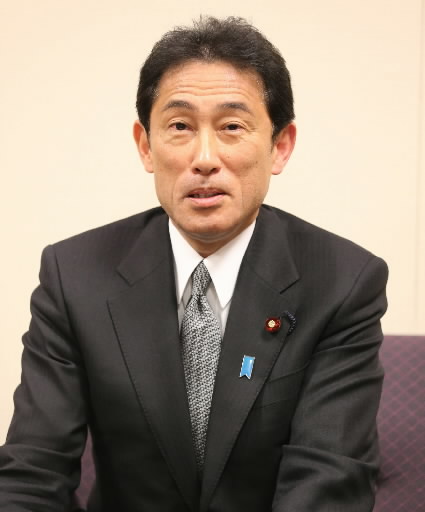Interview with Fumio Kishida, Minister of Foreign Affairs
Jan. 10, 2013
For nuclear disarmament, “it’s vital to build upon specific and practical steps”
by Kohei Okata, Staff Writer
The Chugoku Shimbun interviewed Fumio Kishida, who was appointed Minister of Foreign Affairs in the Abe administration. These are excerpts from that interview.
Will you continue to firmly maintain the three non-nuclear principles?
I recognize that the three non-nuclear principles are very important tenets that have been supported by successive cabinets. They must be observed in the future, too. We have not held any discussion on a review of these principles.
As Minister of Foreign Affairs, and a lawmaker from Hiroshima, how will you pursue diplomatic negotiations on nuclear disarmament?
The Non-Proliferation and Disarmament Initiative [NPDI, made up of 10 non-nuclear weapon states] is an important group. Its gathering of foreign ministers is planned for Hiroshima in 2014. We must make the most of this framework in conveying messages to the international community.
There are a number of challenges, such as strengthening the Nuclear Non-Proliferation Treaty (NPT) regime, but it’s vital to build upon specific and practical steps. In this sense, too, the NPDI is important.
The Abe cabinet is said to be on the right. As a member of the cabinet, and leader of the Kochikai, a moderately conservative group, what stance do you take?
I am aware that the Abe cabinet is considered right-leaning. We have to explain fully to the public that the central government will do the things it was tasked to do. As to how the public and the international community will interpret our government’s efforts, I would like to play a role in providing a sense of security by showing a wide range of activity and a sense of balance in my actions.
How will you improve relations with China, where there is tension over the issue of the Senkaku Islands in Okinawa Prefecture?
The Senkaku Islands are clearly part of Japanese territory, both in historical fact and under international law. We must take a firm stand on this. At the same time, bilateral relations between Japan and China are of great significance. The relationship must be strengthened and developed further in various fields. It’s important to take a broad view of things while tackling the specific challenges that our two nations face.
What is your attitude toward exercising the right of collective self-defense?
This is an issue that the whole cabinet should address, as we listen to Prime Minister Abe’s thoughts and hold discussions within the ministries concerned. As a member of the cabinet, I must pursue my work in line with the prime minister’s ideas and the policy set by the cabinet.
(Originally published on December 29, 2012)
by Kohei Okata, Staff Writer
The Chugoku Shimbun interviewed Fumio Kishida, who was appointed Minister of Foreign Affairs in the Abe administration. These are excerpts from that interview.
Will you continue to firmly maintain the three non-nuclear principles?
I recognize that the three non-nuclear principles are very important tenets that have been supported by successive cabinets. They must be observed in the future, too. We have not held any discussion on a review of these principles.
As Minister of Foreign Affairs, and a lawmaker from Hiroshima, how will you pursue diplomatic negotiations on nuclear disarmament?
The Non-Proliferation and Disarmament Initiative [NPDI, made up of 10 non-nuclear weapon states] is an important group. Its gathering of foreign ministers is planned for Hiroshima in 2014. We must make the most of this framework in conveying messages to the international community.
There are a number of challenges, such as strengthening the Nuclear Non-Proliferation Treaty (NPT) regime, but it’s vital to build upon specific and practical steps. In this sense, too, the NPDI is important.
The Abe cabinet is said to be on the right. As a member of the cabinet, and leader of the Kochikai, a moderately conservative group, what stance do you take?
I am aware that the Abe cabinet is considered right-leaning. We have to explain fully to the public that the central government will do the things it was tasked to do. As to how the public and the international community will interpret our government’s efforts, I would like to play a role in providing a sense of security by showing a wide range of activity and a sense of balance in my actions.
How will you improve relations with China, where there is tension over the issue of the Senkaku Islands in Okinawa Prefecture?
The Senkaku Islands are clearly part of Japanese territory, both in historical fact and under international law. We must take a firm stand on this. At the same time, bilateral relations between Japan and China are of great significance. The relationship must be strengthened and developed further in various fields. It’s important to take a broad view of things while tackling the specific challenges that our two nations face.
What is your attitude toward exercising the right of collective self-defense?
This is an issue that the whole cabinet should address, as we listen to Prime Minister Abe’s thoughts and hold discussions within the ministries concerned. As a member of the cabinet, I must pursue my work in line with the prime minister’s ideas and the policy set by the cabinet.
(Originally published on December 29, 2012)








